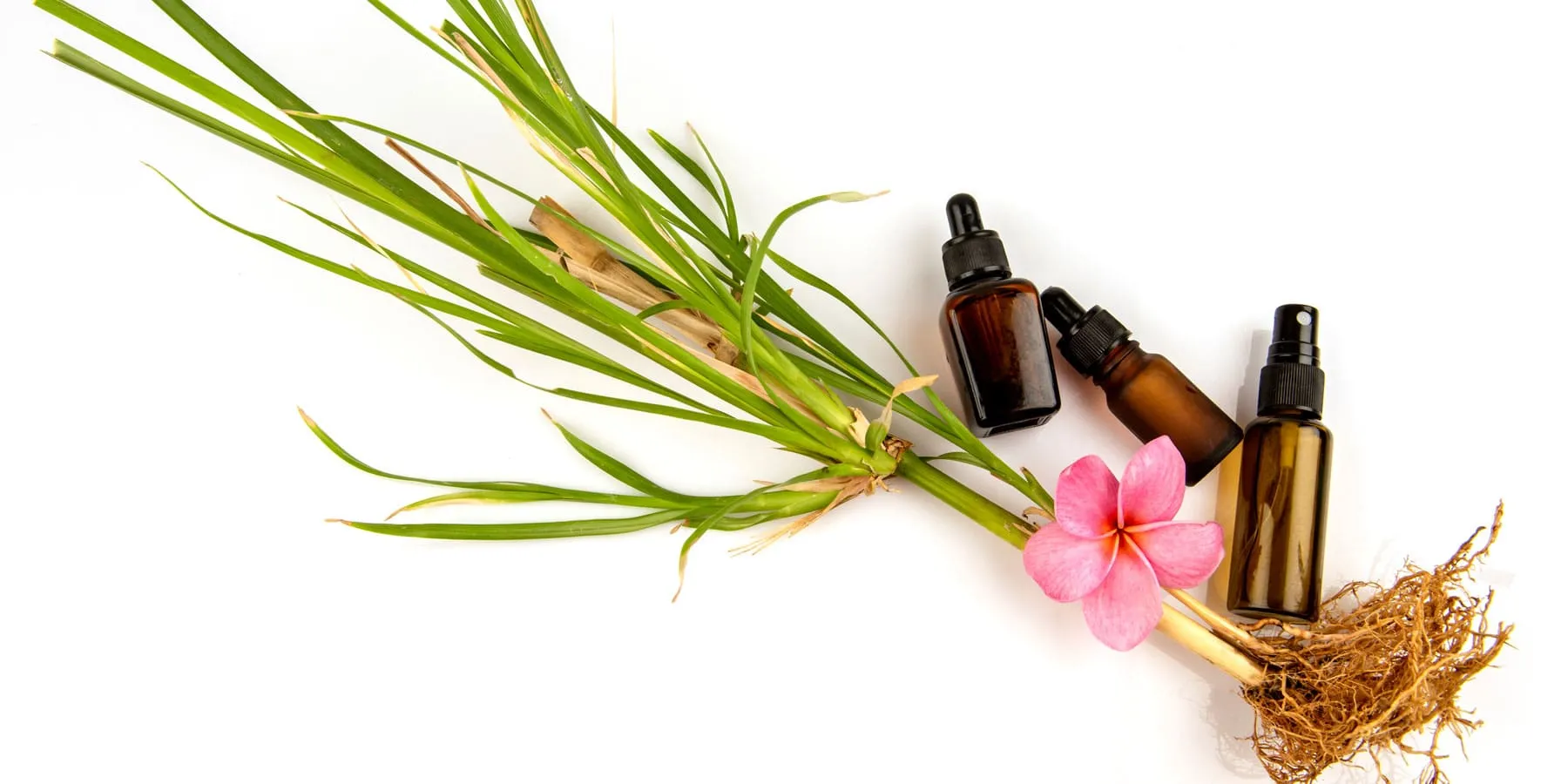Benefits and Uses of Vetiver Oil

What is vetiver oil?
Vetiver oil, also known as khus oil, is one of the lesser-known plant oils. It offers a heavy, earthy fragrance. It is believed to be very grounding, calming and stabilizing, and provides a range of uses and benefits. Chrysopogon zizanioides, commonly known as vetiver, is a perennial grass that belongs to the Poaceae family, which is native to India. In Western and Northern India, it is called “khus.” It can grow up to 2 meters tall, with brownish-purple flowers, tall stems, and long, thin and rigid leaves. Today, vetiver is widely cultivated in the world's tropical regions.
Vetiver essential oil is derived through the steam-distillation of the plant's roots. It has a strong initial aroma, and is described as woody, smoky, earthy, herbaceous and spicy. One of the most valued qualities of vetiver oil is that it is deeply grounding, and often used to help promote sleep. It is also said to be equally helpful for restlessness.
According to a paper by U.C. Lavania from India, the chemical composition of vetiver oil is extremely complex. It mainly comprises sesquiterpenes and sesquiterpene derivatives, of which vetiverols, their carbonyl compounds and esters, serve as the main constituents. Their relative abundance normally dictates the quality of the oil.
Three carbonyl compounds are deemed the primary odor-influencing components of this essential oil, which is used extensively to blend oriental-type perfumes and floral compounds, along with other cosmetic and aromatherapy applications. Vetiver oil is also a main ingredient in 36 percent of all Western-quality perfumes and 20 percent of all men's fragrances. The plant’s main fibrous roots are important for oil quality.
A separate study published in the Journal of Essential Oil Research looked at the chemical composition of selected vetiver essential oils. Results show that it has about 110 constituents, mainly sesquiterpenes. The characteristic constituents were beta-vetispirene (1.6 to 4.5 percent), khusimol (3.4 to 13.7 percent), vetiselinenol (1.3 to 7.8 percent) and alpha-vetivone (2.5 to 6.3 percent).
How is vetiver oil used?
Almost the entire vetiver plant is used for various applications. Its roots have been particularly popular since ancient times.
Vetiver essential oil is not only extensively utilized in perfumery, but it’s also a flavoring agent in beverages and other foods. Its aromatic effect on the mind is calming and balancing, while its other notable medicinal properties include antiseptic, antispasmodic, immune stimulating, sedative to the nervous system and stimulating to the circulatory system.
Vetiver oil's calming and soothing properties have been believed to help dispel anger, hysteria and irritability, as well as reduce neurotic behavior. This in turn, reduces stress and tension. These revitalizing qualities make vetiver oil useful for helping relieve physical and mental exhaustion, and for addressing issues ranging from general aches and pains to insomnia and anxious feelings.
What are the benefits of vetiver oil?
Vetiver essential oil may help provide the following health benefits:
- Enhance libido and improve sexual health
- Provide relief to insomnia patients
- Alleviate skin problems like wrinkles and overproduction of sebum
- Eliminates microbes
- Provides relief from all types of inflammation
- Improve and maintain good nerve health
- Boost immunity
- Heal wounds by promoting growth of new tissues
Vetiver oil is also believed to benefit those who are suffering from the following conditions:
- Acne
- Anxiety
- Absentmindedness
- Tendonitis
- Arthritis
- Vitiligo
- Depression
- Joint Stiffness
- Menstrual Cramps
- Mental Fatigue
- Sore Feet
Vetiver oil may also help control attention-deficit hyperactivity disorder (ADHD) thanks to its calming effects. A 2001 study conducted by Dr. Terry Friedman found that the oil's aroma improved the brain activity and reduce the symptoms of children with ADHD.
To harness these benefits, vetiver oil can be administered in different ways. It can be applied topically (recommended diluted with a carrier oil), directly inhaled or diffused. The oil blends well with the essential oils of benzoin, grapefruit, jasmine, lavender and ylang-ylang.
Recipe for making vetiver oil

The roots of vetiver undergo steam-distillation in order to produce the oil. Vetiver essential oil is painstaking and labor-intensive to manufacture, which drives its price up. To reduce production cost, it may be diluted with less expensive (and therefore less effective) oils, or even synthetic fragrance oils.
This is why you should make sure you are buying vetiver oil from a reputable source. There are several vetiver oil recipe blends for specific health concerns. Here are three you can try:
• Stress-relief blend — Blend 1 drop of vetiver oil, 2 drops of lavender and 3 drops of chamomile in 1 ounce of carrier oil. Massage the blend onto the affected area.
• Better sleep blend — Blend 3 drops of vetiver oil, 3 drops of lavender oil and 2 drops of frankincense oil in 1 ounce of carrier oil. Add this to your diffuser.
• Pain-relief blend — Blend 4 drops myrrh oil, 3 drops lemongrass oil, and 2 drops each of eucalyptus and vetiver oil in 2 ounces of carrier oil. Massage onto the affected area.
It is best to dilute vetiver oil with a carrier oil, such as organic coconut oil, due to its high potency.
Vetiver oil works in vapor therapy by addressing nervous complaints, dispelling anger and irritability, and relieving insomnia. It can also be blended as a massage oil or diluted in the bath. Through this mode of administration, it can assist with mental and physical exhaustion, nervous complaints, rheumatism and arthritic pain and skin healing.
This essential oil also works in a cream or lotion, moisturizing and nourishing skin. It especially benefits dry, irritated and dehydrated skin, and helps reduce wrinkles and stretch marks.
Important Note:
This essential oil is deemed nonirritating and nontoxic, and therefore generally safe. It may potentially be unsafe for pregnant women, as it might cause a miscarriage, because possible side effects are currently unknown in pregnant and breastfeeding women and nursing babies, as it may have negative effects on your nursing baby.
References:
Medicines (Basel). 2017 Jun; 4(2): 41.
Vetiver.com
Journal of Essential Oil Research 2006, 14(4):416-22
Huffington Post May 31, 2016
WebMD
RELATED POSTS